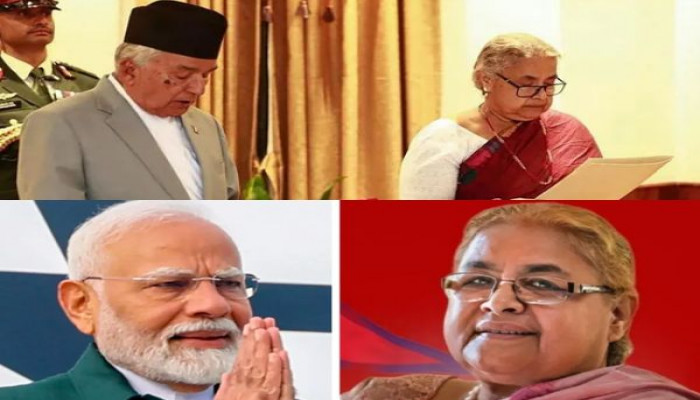PM Modi extends best wishes to Nepal’s first woman prime minister, Sushila Karki
- In Reports
- 07:15 PM, Sep 13, 2025
- Myind Staff
India is dedicated to ensuring peace, progress, and prosperity for the people of Nepal, Prime Minister Narendra Modi said on Saturday while extending his best wishes to Nepal’s new Prime Minister Sushila Karki.
Nepal’s President Ram Chandra Paudel administered the oath of office to the country’s newly appointed Prime Minister Sushila Karki during a swearing-in ceremony in Kathmandu on September 12, 2025. Karki, a former Chief Justice and well-known anti-corruption activist, has become Nepal’s first woman Prime Minister. She took the oath after being selected by student groups whose protests earlier this week forced the resignation of former Prime Minister KP Sharma Oli.
The swearing-in came hours before President Paudel announced the dissolution of parliament and called for fresh elections on March 5, 2026, after a week of deadly unrest that plunged the country into its worst political crisis in years.
According to the president’s statement, he has “dissolved the House of Representatives” and fixed March 5 for national elections. Karki’s appointment followed two days of intense negotiations between Paudel, army chief Ashok Raj Sigdel and protest leaders after at least 51 people were killed and more than 1,300 injured in violence triggered by the government’s social media ban.
The Indian government welcomed the formation of the interim administration. “Heartfelt congratulations to the Honourable Sushila Karki Ji on assuming the office of Prime Minister of Nepal's interim government. India is fully committed to the peace, progress, and prosperity of Nepal's brothers and sisters,” Modi said in a post on X.
In another message earlier in the week, he wrote, “I extend my best wishes to Right Hon. Mrs. Sushila Karki on assuming office as the Prime Minister of the Interim Government of Nepal. India remains firmly committed to the peace, progress and prosperity of the people of Nepal.”
On Tuesday, Modi chaired a meeting of the Cabinet Committee on Security to review the situation in Nepal. Describing the violence as “heart-rending,” he said he was “deeply pained by the deaths of many young people.” “The stability, peace and prosperity of Nepal are of utmost importance to us,” the Prime Minister said.
The anti-graft protests, largely led by Gen Z students, began after a controversial social media ban and widened into demonstrations against corruption and misrule by Oli’s government. A police crackdown left over 20 students dead, fueling more anger that ultimately forced Oli to resign on Tuesday.
Even after his resignation, violence swept across Kathmandu and other cities, with mobs setting fire to government buildings, including Parliament and the homes of political leaders. By Friday night, more than 50 people had been killed before the army restored order.
By Saturday, signs of normalcy began returning to the country of 30 million, with shops reopening and traffic resuming in parts of Kathmandu after prohibitory orders were eased. However, anger still simmered on the streets.
Relatives of those killed gathered outside the Prime Minister’s residence, demanding recognition and compensation. “My brother should be declared a martyr as he died for the country, and the government should give compensation to my parents,” said Sumitra Mahat, sister of 21-year-old Umesh Mahat, who was shot dead during the protests. Families displayed banners with photographs of the deceased and refused to take bodies from the morgue until their demands were met.
Nepal has faced political and economic instability since the abolition of its monarchy in 2008, with successive governments struggling to deliver jobs and stability. Millions of young Nepalis continue to migrate for work in countries such as Malaysia, South Korea and those in the Middle East.
With parliament dissolved and fresh elections set for March, Nepal now faces the dual challenge of restoring peace on the ground and managing a delicate political transition under its first woman Prime Minister.







Comments